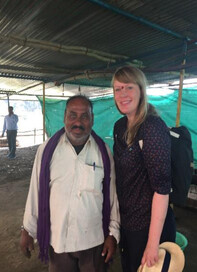In conversation with Line Wesley-Holand –Senior Advisor- Fairtrade Norway

Line Wesley-Holand works as a Senior Advisor at Fairtrade Norway. She pursued her Masters in Communication and Philosophy from Roskilde University, Denmark and has a broad experience in sustainability, ethical trade practices, strategy development and implementation within private sector, retail and energy.
Q. Could you tell us about the role of NFO in the Market front? Are they in a position to influence brands to source cotton from specific regions?
A. The Norwegian market on textile is not quite huge and the players a looking at each other sustainability approaches and they tend to choose the same solution. When some large players choose Fairtrade cotton I hope and think we will be able to get a domino effect. The majority off the brands are members of Ethical Trading Norway which we are having a close dialogue with and are invited to speak about Fairtrade cotton at members meetings.
Q. How is the current market situation for Fairtrade Cotton especially with other ‘Sustainability labels’ increasing their market share?
A. BCI are still the largest sustainable label in cotton in Norway, also organic cotton and The Swan, the official Nordic ecolabel, are growing in the Norwegain market. As an NFO our most important job is to build knowledge on the Fairtrade impact for the farmers and the understanding of why sustainable cotton is no longer a choice to be taken, but a must do.
Q. Do you foresee any growth in demand for FT cotton from Asia in the coming years? What are the challenges?
A. Difficult to predict the growth the coming years, but we have a hope that it will increase thanks to our licensees and potential new ones.
Q.How can we improve positioning of Fairtrade cotton in the market as compared to other ‘responsible fibres’?
A. I think one of the keys here will to also talk about how Fairtrade works to reduce the use of water and pesticides in the cotton growing. Illustrate the impact for the environment and the farmers and also be able to actually measure the reduction.
Q.Can you highlight few brands who are majorly sourcing Fairtrade cotton from Asia? What are their interest and expectation before building a supply chain partnership with any trader or producer?
A. Dressmann, Bik Bok, and Princess. We think our licensees are concerned about sustainability and the impact in their value chain, that’s why they are partnering with Fairtrade.
Q.What are the Fairtrade Awareness initiatives adopted by Fairtrade Norway for increasing visibility and market presence of FT Cotton in your region? What are the main factors that influence the purchasing power of the end consumers in Norway?
A. When Dressmann, one of the leading fashionvchains for menswear in Northern Europe, in November 2017 announced their commitment to Fairtrade we gained some media attention and have been communicating in Social Media. We have just hired a new person at our office which will be dedicated to work with consumer communication and cotton will be one of our priorities to communicate.
The majority off the Norwegian consumers are quit price orientated also when it comes to garments, but off course design plays a role and awareness about sustainability in fashion is growing after Rana Plaza. It is also a growing trend to buy used clothes, to repair clothes and rental of clothing is emerging.
Q.How can our cotton producers improve their visibility in the Global Market? Is there a potential for FT Norway to facilitate POs meet market requirements?
A. I think that we have potential in working more together on visibility and one of the keys I think will be to get more NFOs to visit the SPOs, their fields and Premium projects to learn and see with their own eyes the impact of Fairtrade. Also it might be seminars or meetings that farmers and or NAPP staff could join via skype or presence, but I think the outcome will be strongest when retailers visit the cooperatives and meet the farmers in the field and learn about farming and harvest. In 2017 I visited both Noble Ecotech and Prathiba and the meetings with the farmers, their families and all the children at the Prathiba School.
Q.Can you give us a short brief us on the Cotton Business Plans & Priorities for 2019?
A. Cotton is one of our main strategic raw materials we work to gain growth and we see a big potential hence the fact that only 15% (2016/2017) of the worlds cotton is grown sustainable and only a fifth of this bought as sustainable. And when big buyers as Dressmann has committed to source 100%
sustainable cotton by 2025 in an effort to improve social and environmental conditions across its entire supply chain I am optimistic.
Q.Lastly, can NAPP provide support in alignment with the plan?
A. Continue to support NFOs on field trips with licensees or potential licensees. It is not only a great way to learn more about the impact for the
farmers, but I also see that it makes commitment. Supporting NFOs with producer stories and photos from the cooperatives and continuing the good job on supporting NFOs with supplier information and recommendations for potential licensees on which suppliers to choose.



